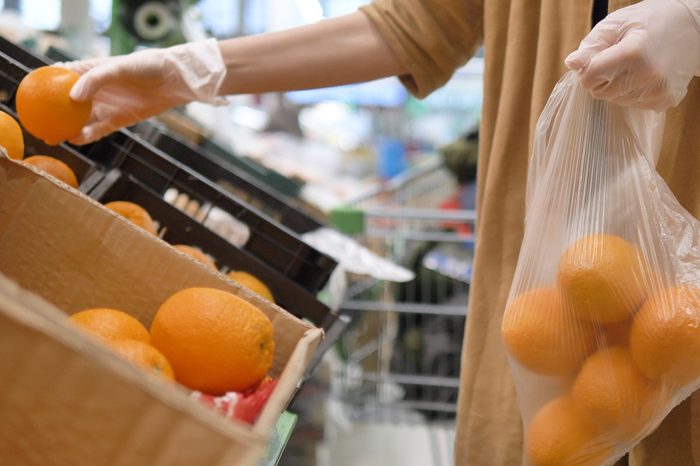
Information on the coronavirus is changing seemingly on a daily basis.
Right now the one constant is the continued importance of protecting yourself (and those around you) from Covid-19 to flatten the curve of infections.
Initially, experts stressed that only medical workers such as doctors and nurses needed masks. The World Health Organization (WHO) also recommends those who are sick or are caring for someone who is sick to wear a mask. But now, some health officials are starting to change their tune. (Of course, it’s still important not to hoard masks, since they are critical for medical professionals.) The Centers for Disease Control and Prevention (CDC) is considering updating its mask guidelines to recommend face coverings in public.
While we’re still sorting out the use of face masks by the public, what about the use of gloves. They’re seen as important gear to help stop the spread of germs, but are they recommended for civilians? Or, should they be left solely to medical professionals? Also, if you do use them, what are the best practices to ensure you’re safe?
To protect your health, our team of experts provides the latest guidance when it comes to using gloves.
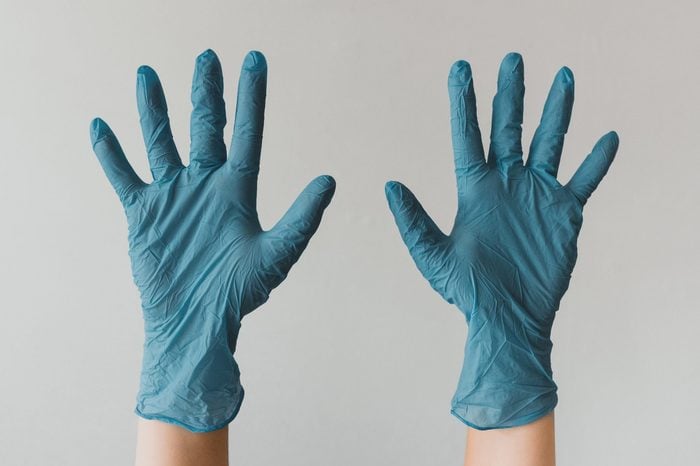
The use of gloves among non-medical professionals
There’s a lot of misinformation when it comes to protecting yourself from Covid-19. You see some people wearing gloves while others don’t. Kathleen Winston, dean of nursing at the University of Phoenix helps set the record straight: “Gloves are not recommended for the general public,” she says.
“Healthcare providers need to have gloves for the very sick and that includes many others hospitalized for other diagnoses besides Covid-19,” she explains. The use of gloves by the general public only increases the potential for reduced availability, Winston adds. Plus, “it does not improve the prevention [of Covid-19] for the public.”
The WHO also emphasizes the importance of making sure you’re not taking vital gloves away from healthcare workers. “As an element of the [personal protective equipment] PPE package, gloves are recommended for health care providers and caregivers taking care of Covid-19 patients and their use should be prioritized for the frontline workers more at risk to get the disease,” they write, in an email.
Realistically, however, many people are wearing gloves, whether they’re recommended or not. If you’re in that category, following best practices is crucial. (Plus, find out how doctors protect themselves from coronavirus.)
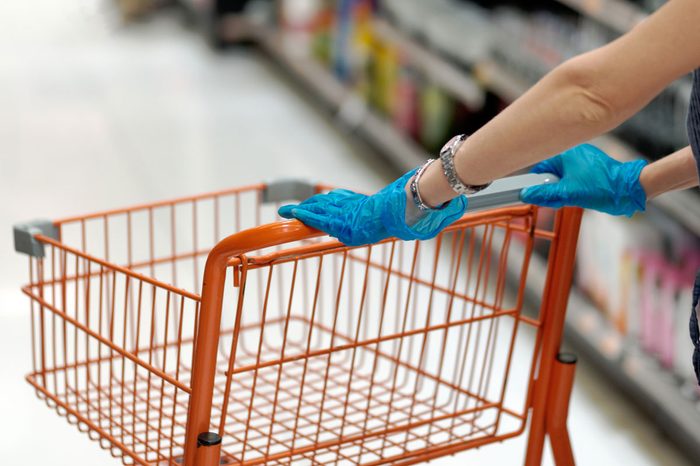
Types of gloves
When it comes to gloves, not all are created equal. You may notice there are a variety of options to choose from. There are three types of medical gloves: examination, surgical, and medical-grade, explains Winston. “Gloves are regulated by the Food and Drug Administration to achieve standards for leak and tear resistance and biocompatibility,” she says. However, she cautions that non-medical gloves, such as rubber gloves, will not prevent the spread of the virus.
Cynthia Weston, associate dean for clinical and outreach affairs at the College of Nursing at Texas A&M University in College Station, adds to the list of gloves to avoid: “Cloth or other porous fabric gloves would not be protective. Latex, nitrile, and vinyl gloves have all been used.” Long-lasting and stronger than latex, nitrile is a particularly popular choice.
But Weston cautions against feeling that gloves will automatically keep you safe. “The issue with gloves can be a false sense of protection when someone continues to touch their face or other objects spreading contamination,” she says. In other words, just because you’re wearing gloves doesn’t mean you’re staying safe from Covid-19. This is especially true if you’re touching your face or other regularly used objects like cell phones while wearing them.
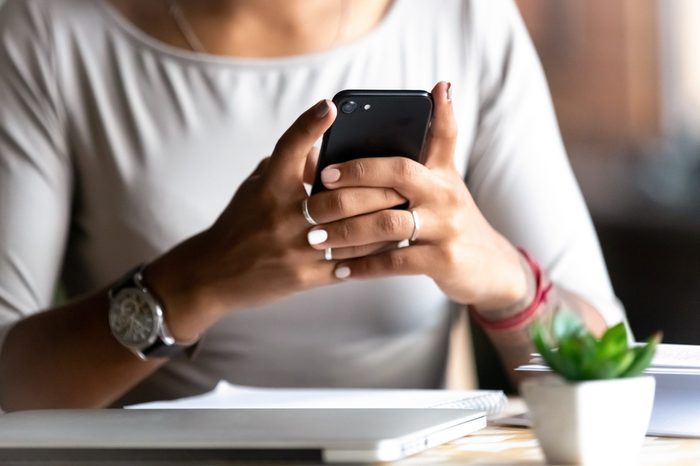
Touching surfaces
It’s not only your face that you need to avoid touching. “Surfaces can be contaminated with the virus,” the WHO writes. One way of protecting yourself from the virus is to “regularly clean and disinfect surfaces frequently touched,” they suggest.
There are studies conducted on previous coronavirus outbreaks—SARS-CoV and MERS-CoV—that demonstrate the virus can linger on different surfaces for a few days. According to the WHO, this depends on a few factors, including temperature, humidity, and light. But how environmental contamination can lead to the transmission of Covid-19 is still not clearly understood.
The WHO says they published a protocol “to determine viable virus presence and persistence on surfaces in various locations where a COVID-19 patient is receiving care or isolated.” They add, “more investigations and analysis of the epidemiological data is still required to understand the full extent of the transmission.”
So, out of an abundance of caution, it’s best to assume that everyday surfaces used, such as your cell phone to a door handle, may be contaminated with viruses that can last for days. (Learn how to properly clean and disinfect your phone during Covid-19.)
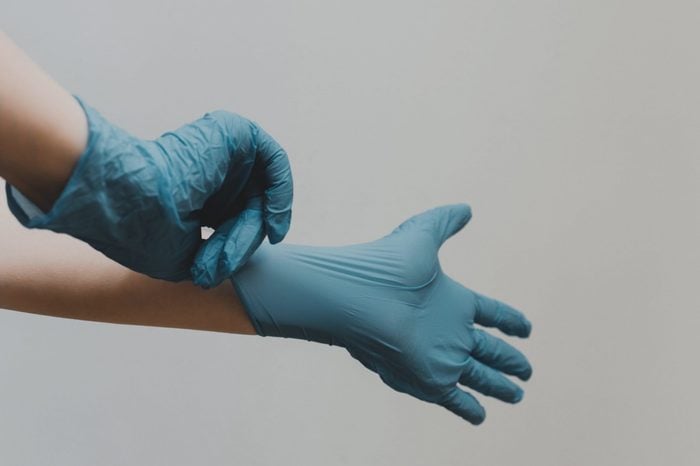
The rules of tossing and reusing gloves
If you choose to wear gloves, and you don’t throw them away immediately after use, you could run into some issues. You’re either potentially cross-contaminating everything you touch. Another no-no: You’re sanitizing/washing the gloves while continuing to wear them. Luckily, Winston says, all types of medical gloves are disposable.
Weston agrees, explaining that it’s important to throw away gloves to avoid contamination. “Gloves are never meant to be reused and gloves can become contaminated and contaminate other objects, surfaces or even self.” The single most important way to prevent spread: hand hygiene. “Hands should be washed for 20 seconds before and after glove use. Contamination and recontamination is the driver of infection risk.”
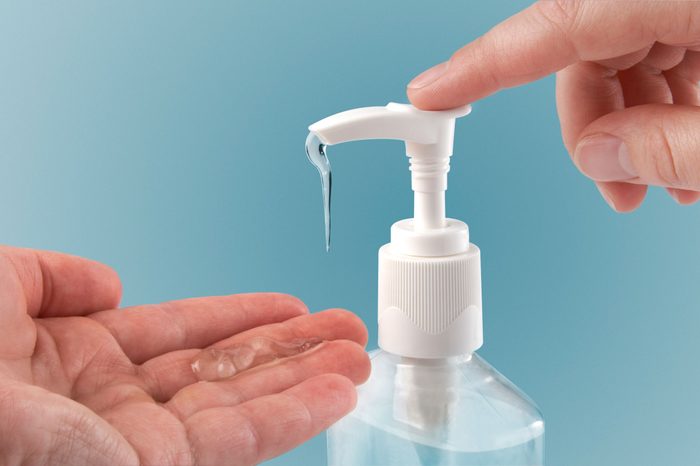
Don’t use hand sanitizer on gloves
You may use your gloves to go to a public bathroom and wonder if you should wash them before leaving. Or, perhaps you may be tempted to apply hand sanitizer. But Winston says you should absolutely not. “Do not share, wash or disinfect gloves.”
Gloves are made to be disposable, and putting hand sanitizer on them could lead to rips and tears. Unless they are specifically designed to be sanitized, don’t. If you have an extra pair of gloves on you, it would be better to remove the dirty pair in favour of a clean one. Or, you could even try doubling up gloves, peeling off the top layer to reveal a fresh pair underneath, a practice known as “double gloving.” (FYI: This is how long hand sanitizer lasts on your hands.)
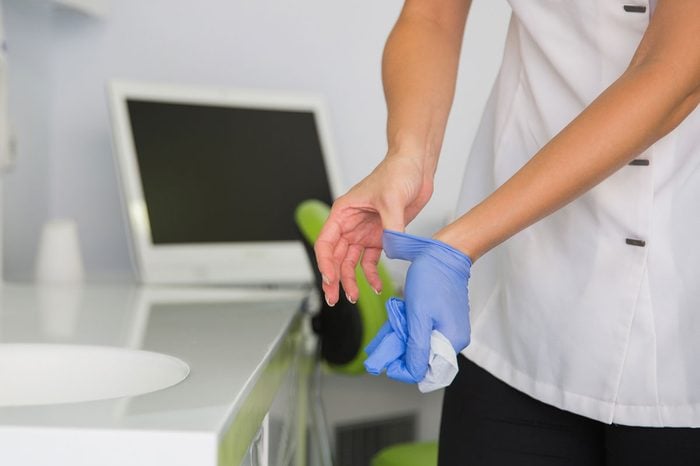
Proper glove use and disposal
Failing to wear your gloves properly is as dangerous as not wearing them at all—perhaps more, because if you’re not wearing gloves, you might wash your hands and be more careful in general.
“Wash hands first before putting gloves on,” Winston says, explaining the best practices for wearing gloves. “Proper fit is necessary. Sharp objects puncture medical gloves. Change gloves anytime there is a rip or tear.” As far as disposal, she says, “Glove disposal for healthcare workers is wrist to finger removal and disposal into the assigned receptacle.”
Weston agrees and adds that you should wash your hands before and after glove use. “Gloves should always be used when coming into contact with blood or body fluids. When applying any personal protective equipment, gloves should be the last on and the first off with hand hygiene before touching anything after glove removal,” she says.
Luke Padwick, MD, founder and CEO of Austin Emergency Center says he likes to teach medical people to think of the world as clean and dirty. For example, Dr. Padwick says, “There’s your clean space (home) and dirty space (the ER). A non-infected/non-contaminated area is clean, but the doorknob on the outside is contaminated—so use your gloves outside on the knob, and then take them off before coming inside.” Or, he says, if you shop with gloves on, you should take the gloves off before you enter the car to go back home. Dr. Padwick explains, “You have worn them out and about but you treat the inside of your car as clean space.”
After you’ve removed and discarded the gloves, it’s critical to—you guessed it—wash your hands, not to mention disinfect anything you’ve touched while wearing the gloves.
(Pandemic stress affecting your mental health? Here’s how to cope with Covid-19 anxiety.)
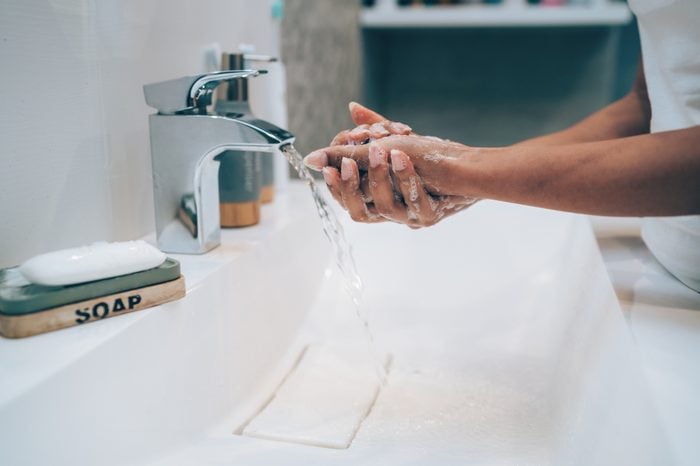
Where should you wear gloves?
Regardless of where you’re going, the official line is that you don’t need to wear gloves. Instead, prioritize handwashing and avoid touching your face. However, knowing that coronaviruses can survive on surfaces for hours to days, according to the CDC, it’s only natural to want to protect yourself.
If you do insist on wearing gloves to, say, grocery shop, check your mail, or visit the doctor’s office or pharmacy, take every precaution to make sure you don’t touch your face while wearing them. And, once you’re done wearing the gloves and have discarded them, wash your hands thoroughly with soap for at least 20 seconds. (Also, make sure you’re not making these common handwashing mistakes.)
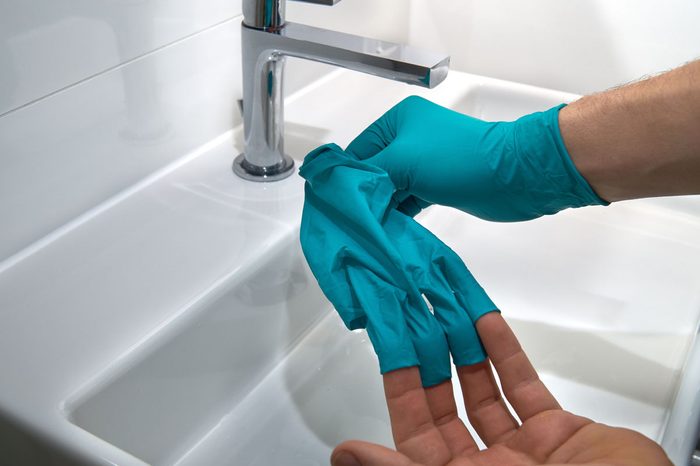
Is it okay to go glove-free?
Yes. “Wearing gloves causes individuals to sanitize their hands with handwashing and alcohol sanitizers less frequently,” says Winston. According to Dr. Padwick, “Gloves are only helpful if you are using them in a specific amount of time and you are in a high-risk category, otherwise, they give a sense of false security.”
There is a risk that some people will develop a false sense of protection from wearing gloves. “My worry is a reliance on gloves when not indicated gives a false sense of protection. Covid-19 is not an infection to be feared but respected. We should all take steps to protect others and protect ourselves,” Weston says.
And at the end of the day, it all comes back to hand-hygiene. “Handwashing is the single most important activity to prevent the spread of infection,” Weston advises.
Next, read up on the household products that kill coronavirus.
